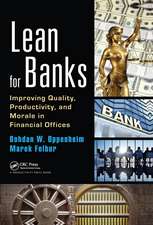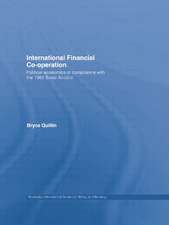The Politics of Financial Risk, Audit and Regulation: A Case Study of HBOS
Autor Atul Shahen Limba Engleză Paperback – 8 aug 2017
This book is the first academic study of this collapse, uncovering some surprising evidence on the power and politics of large financial institutions. It details the processes and degrees to which financial challenge and regulation are undermined by this power. The research exposes a pro-active process of regulatory risk management by these institutions; the ease with which auditors and regulators can be captured; and how politicians and investors can be all too happy to hop on the stock market and management spin ride – with other people’s money. The study questions the ideology and politics which supported and encouraged the management hubris, raising profound questions about the ‘politics’ of the academic disciplines of banking, finance and accounting today, and the theories they underpin.
This account of management gone wrong is essential reading for students, researchers and professionals involved in banking, finance, credit infrastructure, economics and management studies.
| Toate formatele și edițiile | Preț | Express |
|---|---|---|
| Paperback (1) | 409.40 lei 6-8 săpt. | |
| Taylor & Francis – 8 aug 2017 | 409.40 lei 6-8 săpt. | |
| Hardback (1) | 764.87 lei 6-8 săpt. | |
| Taylor & Francis – 7 aug 2017 | 764.87 lei 6-8 săpt. |
Preț: 409.40 lei
Nou
Puncte Express: 614
Preț estimativ în valută:
78.34€ • 82.09$ • 64.76£
78.34€ • 82.09$ • 64.76£
Carte tipărită la comandă
Livrare economică 12-26 aprilie
Preluare comenzi: 021 569.72.76
Specificații
ISBN-13: 9781138042353
ISBN-10: 1138042358
Pagini: 178
Ilustrații: 1 Tables, black and white
Dimensiuni: 156 x 234 x 13 mm
Greutate: 0.29 kg
Ediția:1
Editura: Taylor & Francis
Colecția Routledge
Locul publicării:Oxford, United Kingdom
ISBN-10: 1138042358
Pagini: 178
Ilustrații: 1 Tables, black and white
Dimensiuni: 156 x 234 x 13 mm
Greutate: 0.29 kg
Ediția:1
Editura: Taylor & Francis
Colecția Routledge
Locul publicării:Oxford, United Kingdom
Public țintă
Postgraduate, Professional Practice & Development, and UndergraduateCuprins
Foreword by Ian Fraser
1. Introduction
2. About HBOS
3. The Politics of Risk Management
4. The Chemistry of Audit Failure
5. Regulatory Failure
6. Findings and Implications for Finance Teaching and Research
1. Introduction
2. About HBOS
3. The Politics of Risk Management
4. The Chemistry of Audit Failure
5. Regulatory Failure
6. Findings and Implications for Finance Teaching and Research
Recenzii
‘Professor Shah has produced an unconventional, emotional and invaluable post-mortem of the ethical dimensions of the HBOS scandal. It calls on our business schools to help students cope with the deep moral challenges they are likely to face in an increasingly amoral business world. En-route, he holds up Paul Moore as the exemplar of what is needed. But the whole establishment, is implicated.’ — Andrew Phillips (Lord Phillips of Sudbury)
'In The Politics of Financial Risk, Audit and Regulation: A Case Study of HBOS, Atul K. Shah examines the HBOS collapse of 2008, and uses it as a platform to more broadly critique the ways in which finance is regulated by governments and the audit profession and conducted in practice, its uneasy relation to politics and authority and the manner of its teaching in tertiary educational institutions globally.' — Dr. Prabhu Sivabalan is an Associate Professor at the UTS Business School (LSE Review of Books)
'In The Politics of Financial Risk, Audit and Regulation: A Case Study of HBOS, Atul K. Shah examines the HBOS collapse of 2008, and uses it as a platform to more broadly critique the ways in which finance is regulated by governments and the audit profession and conducted in practice, its uneasy relation to politics and authority and the manner of its teaching in tertiary educational institutions globally.' — Dr. Prabhu Sivabalan is an Associate Professor at the UTS Business School (LSE Review of Books)
Descriere
Contemporary economics and finance theory dominates the study and practice of banking. However, it is very weak in areas like culture, ethics and politics, factors which have a major influence. It assumes that a focus on profit and value maximisation will somehow lead to the best outcomes for society, and completely ignores the political power and influence of large banks, and the degree of responsibility required for the trust endowed upon them by society.
This book investigates the above in depth and comes up with some surprising evidence and analysis, which exposes the need for curbing the political power of these large financial institutions.
This book investigates the above in depth and comes up with some surprising evidence and analysis, which exposes the need for curbing the political power of these large financial institutions.






















